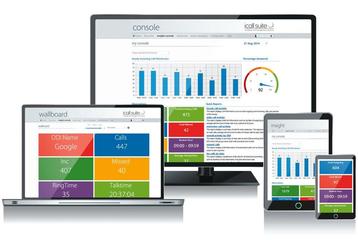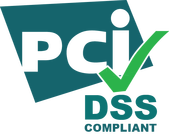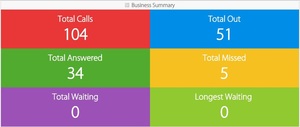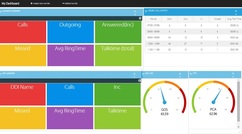 Mid-market vs SME solutions The key difference between selling call recording to SMEs and mid-market companies is that the mid-market is more likely to request integration with CRM or other corporate systems. The focus when selling to the mid-market should be on externalizing information, so it is important to have strong APIs available. This size of company tends to want to do more with call recording but in a centralized way. We believe that the most effective way to sell call recording is to start by understanding their business needs and challenges. Many companies will strive to improve customer service to increase customer retention and satisfaction, in order to impact the bottom line and achieve competitive advantage. Creating a good customer experience is all about knowing what the customer wants and how the customer wants to obtain it. Listening to call recordings provides instant feedback and delivers qualitative research. Call analytics coupled with call recording is a powerful combination and is vital to truly understanding the whole ‘customer journey’. 6 ways call recording can be used in practice to help understand the customer journey When selling, channel partners should emphasize the benefits of call recording in practice:
The telephone is a source for significant insight whilst it remains the preferred method for immediate customer interaction. Call activity happens in real‐time, providing instant feedback for better and quicker decisions. Incorporating call analytics and call recording to any customer service strategy provides business leaders with the assurance that decisions are based on a more complete picture of customers’ behaviour.
0 Comments
 Understanding the whole customer communications experience makes excellence in customer service achievable. Call management provides business-critical call analysis: 1. Unreturned missed calls analysis should be at the heart of any customer service strategy to improve customer satisfaction and retention. 2. Calls tracked in real-time reveal time taken to resolve a call, waiting time and how the call was resolved (by calling in again or being called back). KPIs ensure calls are resolved within a certain time each day. 3. First Contact Resolution (FCR) where a customer's need is properly addressed the first time they call, applies to any business with customer facing teams. An unresolved customer enquiry can result in customer dissatisfaction and significant revenue loss. According to Service Quality Measurement Group, out of all business metrics used to monitor customer facing teams, FCR has the biggest impact on customer satisfaction. FCR helps the channel to justify the value of fully integrated call management on any phone system sale. 4. Analysis of calls answered by an Auto Attendant. A call that is terminated after being answered by an Auto Attendant is an unresolved missed call. It is important that your call management solution can distinguish between a call that is answered by a person and one that is answered by an IVR / Auto Attendant system. 5. Integrated call analytics with call recording enables businesses to track waiting time to be answered or called back, then assess how the call progresses. From this it can be determined if the call outcome was negatively affected by the wait time. Live statistics on contact centres such as call queues, coupled with historical trends enable staff modeling, helping businesses to gain efficiencies. Although customer requirements vary from an overview of business communications to extensive analytics of customer facing teams, improving customer interactions is essential to every business. Call recording is a powerful business tool particularly when integrated with call analytics. It provides clear advantages for both service-centric and FCA regulated companies:
1. Quality assurance and performance monitoring
2. Improve customer service through dispute resolution and risk management
3. Manage staff
4. Regulatory compliance and internal adherence to company policy
5. Reveal customer service workflow issues
6. Understand the whole customer experience
7. More informed decisions
 Payment Card Industry Data Security Standard (PCI DSS) is a huge consideration for many businesses and some industries can be stricter than others. To achieve PCI Compliance the company must establish what is required from their industry regulators. A primary means today of complying with PCI DSS is to pause and resume call recordings, so as not to capture parts of the customer call in which sensitive information is given E.g. credit card data, social security number, etc. Samsung CMS can achieve this in one of two ways:
There are other factors a business must consider in order to be fully compliant, which will be outlined by their industry regulator or auditor. Please see additional information on the Samsung CMS microsite http://www.cmsforsamsung.com/news/call-recording-achieving-compliance  Find suitable vertical markets for the call reporting and recording proposition. • Consider companies with a large number of inbound calls. Missed calls that remain unresolved are proven to result in lost sales and ultimately lost customers. • Consider companies that use auto-attendants to answer calls and direct callers to the correct department. Samsung CMS call reporting is able to present an accurate indication of missed calls because unlike other products, it specifically takes into consideration those that terminate when answered by an auto-attendant. • Consider companies that need to take credit card payments over the phone. Manual and automatic stop/start call recording are both available to facilitate PCI compliance. • Consider ‘informal’ contact centers; companies that have multiple departments receiving inbound calls, such as sales, support or finance departments. Consider those companies that would find it useful to manage call handling resources to achieve optimum productivity. In our experience successful vertical markets for this proposition include markets such as: • Car dealerships • GP surgeries • Veterinary practices • Law firms • Multiple retailers • Taxi firms • Insurance companies • Hotels • Travel agencies • Logistics companies • Garages • Recruitment companies • Small / niche manufacturers Please join the Samsung CMS Linked In Group (https://www.linkedin.com/groups/8391782) to be the first to hear sales tips, technical information and product updates. Please join the Samsung CMS Linked In Group (https://www.linkedin.com/groups/8391782) to be the first to hear sales tips, technical information and product updates.
 Don’t underestimate the importance of using these key product differentiators when selling Samsung call reporting and recording. Monitor unreturned missed calls: Do you know how many calls you miss every day? Do you know how much this costs your business? Do you know how many missed calls remain unresolved? Missed calls result in lost sales. Unresolved missed calls result in lost customers. According to National Business Statistics, 56.7% of callers whose calls are missed, never leave a message and never call back. Unrivalled accuracy when calculating missed calls, even if calls are answered via an auto-attendant: Samsung call reporting is able to present an accurate indication of missed calls because unlike other products, it specifically takes into consideration those that terminate when answered by an auto-attendant. Attain PCI compliance on SIP: Samsung call recording delivers automated stop/start for DTMF on SIP Contact centre modeling for forward planning: Dynamic resource optimization enables supervisors to employ the optimum number of call handlers throughout the day. Review past performance, use “what if” calculations to forward plan and change parameters such as wrap-up time to achieve SLAs. Don’t forget to use the Executive Summary for essential business metrics, recommendations and observations in just one dashboard.  The call management applications of today deliver valuable insight into a customer’s experience through detailed real-time call analytics, such as:
The good news is that whether the call management solution is deployed via the cloud for hosted telephony or on-premise for PBX phone systems, features have now evolved to deliver the same level of analytics and overall functionality. The importance of integration Fully integrated call management centralises and visualises data from inbound calls, outbound calls, call recordings and call handler activity in one application. Integrating this data with customer relationship data brings a new dimension to CRM, by ‘completing’ customer relationship management.
Sharing call management with CRM systems and the wider operations teams across an organisation is proven to improve customer service levels and importantly, to deliver significant competitive advantage. Why the channel should focus on fully integrated call management Gone are the days when such systems were deployed solely in large enterprises. This means that these solutions are now accessible to not just large corporates, but to a huge SME market. Cost effective call recording together with innovation in call management with Unified Communications and CRM integration has meant that SMEs can now take advantage of powerful solutions that deliver real business intelligence. How resellers can demonstrate the value of call management to customers
Our most successful resellers are those that sell 100% of systems integrated with call management and sell the solution before they sell the PBX. The same benefits to customers apply no matter how the solution is deployed although for hosted telephony customers they also benefit from 24/7 access to call analytics from anywhere on any device. In addition the latest features are automatically made available, so there is no requirement for involvement from IT departments. The rise of call recording in conjunction with analytics to achieve excellence in customer service2/5/2015 It is estimated that the UK call recording and quality monitoring market today is worth in the region of £2.0 billion according to industry estimates from two separate analysts Frost and Sullivan and Data Monitor. Frost & Sullivan forecasts that hosted agent performance optimisation (APO), which includes call recording, customer interaction analytics, performance and quality management, and workforce management, will have the strongest growth of any contact center product segment.
The industry continues to be fuelled by the ‘claim culture’ and as a result businesses are looking to be more accountable and have more control over the services they are delivering. Governmental regulations in the UK also contribute to the rise in call recording adoption. The UK’s Financial Conduct Authority (FCA) mandates the recording and archiving of all phone calls dealing with orders, negotiation or arrangement of transactions in its financial services industry. These regulations drive the need for a secure, call recording solution that can capture and store 100 percent of calls. This would enable brokerages to access specific calls if necessary to prove compliance with the government, upon request. However, more and more everyday businesses are recognising value far beyond the regulatory protection call recording provides. Demand continues to grow as they discover that the mining of these calls reveals invaluable customer insight. The widespread adoption of call management solutions has meant they have become more available at more competitive prices. Gone are the days when such systems were deployed solely in large enterprises. This means that these solutions are now accessible to not just large corporates, but to a huge SME market. Cost effective call recording together with innovation in call management solutions with Unified Communications and CRM integration has meant that this market is now taking advantage of powerful solutions that deliver real business intelligence. Every business can now expect not only to achieve a return on their telecoms investment, but also when using call recording in conjunction with call analytics can expect to achieve excellence in customer service, thus creating a real point of differentiation from competitors. Although regulatory compliance is a call recording hot topic, customer statistics show that 75% of businesses are most concerned about adhering to ‘internal compliance’ in line with company quality assurance and policies. Monitoring call quality, staff performance, disputes and abuse, as well as on-going staff training, will be key drivers for any size business deploying call recording.
Where compliance is a business priority, it is often led by card providers / financial establishments that have individual requirements in line with regulations. These requirements may vary based on the amount of transactions made or expenditure, for example. Any business should look at the level of compliance required within their industry and business circumstances when they are looking to implement a call recording solution. Whether the reason for deploying call recording is regulatory compliance or internal compliance, the actual call recording software remains a small element of a business’ overall compliance strategy. Compliance is not simply about technology, it’s about overall business processes. The common misunderstanding is that the purchase of a PCI DSS compliant call recording solution will make a company compliant with relevant regulations and directives. Until the call recording solution is fully automated, whereby the business does not need to rely on staff to follow correct procedures, there will always be room for human error. Being compliant 70% of the time makes a company liable, not compliant. The challenges are the same for SMEs as they are for larger corporations, for example:
Tollring believes that in addition to automated functionality within call recording software, the communication of customer responsibilities is of paramount importance when looking to achieve any form of compliance. Following deployment of a call recording solution, one could argue that it is not the solution itself that is compliant, but how the company uses the solution. A call recording solution can certainly mitigate risk, but every company must understand its responsibilities to become fully compliant. Customers are looking to their Service Provider to help them achieve compliance. SPs who rise to this challenge by delivering a robust product experience which also differentiates them from the competition are the ones most likely to win their customer’s hearts, minds and more importantly – their business and loyalty. |
NEWSPlease keep an eye on this page for the latest news. ARCHIVES
February 2017
CATEGORIES |
|
About Us
At Samsung America we understand the business challenges you face. Budgets are shrinking. Technology is advancing. And you’re in the middle trying to manage both. That’s why our industry-leading solutions are designed to help you boost productivity, maximize efficiency and lower costs. Because with Samsung it's not just business. It’s business, innovated. |
|

 RSS Feed
RSS Feed

